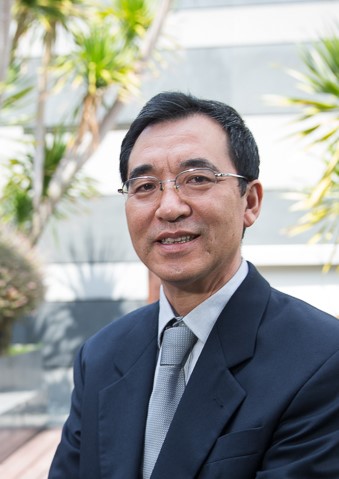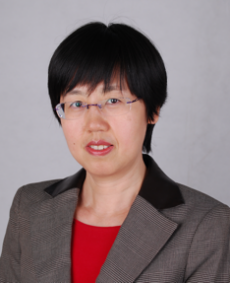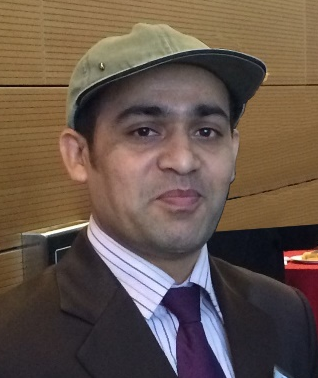
Keynote 1: Prof. Robert H. Deng, Singapore Management University, Singapore
Title: Private Service Discovery, Access Control, and Authentication in IoT Networks
Abstract: Service discovery is essential in wireless communications. However, existing service discovery protocols provide no or very limited privacy protection for service providers and clients, and they often leak sensitive information (e.g., service type, client’s identity and mobility pattern), which leads to various network-based attacks (e.g., spoofing, man-in-the-middle, identification and tracking). In this talk, we will first review some of the existing privacy preserving service discovery protocols in the literature and point out their limitations. We will then present PriSrv which allows a service provider and a client to respectively specify a fine-grained authentication policy that the other party must satisfy before a connection is established. PriSrv consists of a private service broadcast phase and an anonymous mutual authentication phase with bilateral control, where the private information of both parties is hidden beyond the fact that a mutual match to the respective authentication policy occurred. PriSrv is interoperable with popular wireless communication protocols, such as WiFi Extensible Authentication Protocol (EAP), mDNS, BLE and Airdrop, to offer privacy-enhanced protection.
Short-bio: Robert Deng is AXA Chair Professor of Cybersecurity, Deputy Dean for Faculty & Research, School of Computing and Information Systems, Singapore Management University (SMU). His research interests are in the areas of data security and privacy, network and distributed system security, and applied cryptography. He received the Outstanding University Researcher Award from National University of Singapore, Lee Kuan Yew Fellowship for Research Excellence from SMU, Asia-Pacific Information Security Leadership Achievements and Community Service Star from International Information Systems Security Certification Consortium (ISC2), and the Public Administration Medal (Silver), Singapore National Day Awards. He serves/served on the editorial boards of ACM Transactions on Privacy and Security, IEEE Security & Privacy, IEEE Transactions on Dependable and Secure Computing, IEEE Transactions on Information Forensics and Security, Journal of Computer Science and Technology, and Steering Committee Chair of the ACM Asia Conference on Computer and Communications Security. He is a Fellow of IEEE and Fellow of Academy of Engineering Singapore.
Homepage: http://www.mysmu.edu/faculty/robertdeng/

Keynote 2: Prof. Zheng Yan, Xidian University, China
Title: AI-empowered Trust and Trustworthy AI
Abstract: While artificial intelligence (AI) is contributing to the advancement of human society, it also presents us with new challenges. Its trustworthiness is worthy of in-depth exploration. This talk elucidates the aids of AI for trust and indicates the problems of AI trust, especially potential attacks on AI and the factors that impact AI trust. I will introduce recent research achievements of my team, including a GNN-based robust and explainable trust evaluation model and a stealthy and practical audio backdoor attack with limited knowledge. Finally, several insights are proposed regarding AI trust management.
Short-bio: Dr. Zheng Yan, Distinguished Professor at Xidian University, is an IEEE Fellow, IET Fellow, AAIA Fellow, and AIIA Fellow. She is a Stanford World top 2% scientist, and a highly cited researcher by Elsevier in China. Her research interests are in trust management, information and network security, privacy protection, and data analysis. She has published more than 400 papers in prestigious journals and conferences worldwide, including IEEE SP, IEEE TIFS, IEEE TDSC, INFOCOM, and ICSE, with over 270 as first or corresponding author. She has authored two English books, used for teaching for nearly a decade. She holds 110+ international and domestic patents, including 50 PCT patents, with more than150 patents adopted by industry, most of them are solely invented by her. Some of these patents have entered international standards or are widely used. Her U.S. patents are tracked by over 60 Fortune Global 500 companies. She has received numerous awards, including the Nokia Distinguished Inventor Award, three EU awards, N²Women Star in Computer Networking and Communications, IEEE TCSC Award for Excellence in Scalable Computing, IEEE TEMS Distinguished Leadership Award, 18 times of IEEE Outstanding Leadership and Service Awards, AALTO ELEC Impact Award, IEEE ComSoc Big Data Technical Committee Best Journal Paper, IEEE TrustCom Outstanding Paper, Shaanxi Natural Science Award, and Outstanding Doctoral Dissertation Supervisor by the Electronic Association of China. She founded the first IEEE Blockchain International Conference and serves as a Steering Committee Co-chair. She serves as an Executive Editor-in-Chief of Information Sciences and Area Editor/Associate Editor/Editor Board Member for over 60 journals, including ACM Computing Surveys, Information Fusion, IEEE IoT Journal, IEEE Network Magazine, etc. She has served as a General Chair or Program Committee Chair for over 40 international conferences and has delivered over 30 keynote and invited talks at international conferences and renowned enterprises.

Keynote 3: Prof. Zakirul Alam Bhuiyan, Fordham University, USA
Title: Continuous Whole Area Authentication with WiFi-Enabled IoT Networks
Abstract: Most existing authentication systems operate on a “one-time” basis, allowing users to access systems even after they have left the physical location or system. However, this approach poses significant security and privacy risks, including information leakage and unauthorized modifications. The concept of “continuous authentication” was introduced to address these concerns. The system verifies the user’s identity through continuous authentication throughout its operation. The system automatically locks if the user leaves the designated area or station. Unfortunately, this authentication method (whether via password, facial recognition, Windows Hello, or fingerprint) can disrupt normal system operations, significantly compromise user privacy, and necessitate user attention. In this talk, we will explore the potential of achieving continuous user authentication using commodity wireless techniques, specifically Wi-Fi, through signal analysis. Wi-Fi signals are now ubiquitous, permeating homes, offices, and industries. They either pass through us or bounce off our surroundings. Recent technological advancements have revealed that these signals can be leveraged for various beneficial applications, including healthcare monitoring, motion detection, and gesture recognition. This has motivated us to consider continuous authentication in IoT environments. We will also discuss whether this attention-free, touch-free Wi-Fi signals-based solution should preserve the merits of prior wireless system designs, reduce system costs, and maintain user privacy. Additionally, we will illustrate the current state-of-the-art and highlight future research directions.
Short-bio: Zakirul Alam Bhuiyan, PhD, is an Associate Professor of Cybersecurity at the Department of Computer and Information Sciences at Fordham University, NY, USA. He is the Director of the Dependable and Secure System Research (DependSys) Lab and is affiliated with the Fordham Center for Cybersecurity. His research focuses on cybersecurity & privacy, data-driven dependability, trustworthy AI/ML, and emerging IoT/CPS applications. Dr. Bhuiyan authored/co-authored over 250 publications that appeared in many prestigious journals. He has been identified as the High-Cited Researcher for several years and ranked as the “World’s Rising Stars of Science” (2022-2024). He has served as an organizer, general chair, program chair, workshop chair, and TPC member of various international conferences, including IEEE INFOCOM. He is a Senior Member of IEEE and a member of ACM.
Homepage: http://storm.cis.fordham.edu/~bhuiyan/